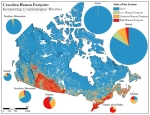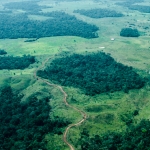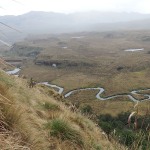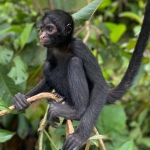The Conservation Solutions Lab is located at the University of Northern British Columbia’s Prince George campus (BC, Canada), surrounded by extensive forests and recreation opportunities.
In the CS Lab, interdisciplinary methods are combined with the big data revolution to develop actionable science for pressing conservation issues. Our basic guiding principle is a belief that there are solutions to seemingly insurmountable environmental problems, particularly when they are engaged at critical times and at the right scales for policy change. We work by collaborating closely with each other and our outside network, and we almost always co-develop our research with conservation practitioners.
NEWS
- Canada’s human footprint reveals large intact areas juxtaposed against areas under immense anthropogenic pressureHappy to share our open access publication that was produced as part of Kristen Hirsh-Pearson’s thesis research that was published in FACETS: Canada’s human footprint reveals large intact areas juxtaposed against … Continue reading Canada’s human footprint reveals large intact areas juxtaposed against areas under immense anthropogenic pressure
- Most species’ declines can be attributed to habitat loss, but there is more to extinction risk than just habitat lossCSL student Juan Pablo Ramírez-Delgado led an international team to measure the relationship between habitat fragmentation, matrix condition and the change in the risk of extinction of 4,426 terrestrial mammals. The … Continue reading Most species’ declines can be attributed to habitat loss, but there is more to extinction risk than just habitat loss
- UNBC PhD candidate Jose Aragon is part of an international research team recognized for its work supporting the United Nations sustainable development goals in South AmericaAragon collaborated on a project funded by the National Aeronautics and Space Administration (NASA) that received a Group on Earth Observations (GEO) Sustainable Development Goal Award. The award, in the intergovernmental … Continue reading UNBC PhD candidate Jose Aragon is part of an international research team recognized for its work supporting the United Nations sustainable development goals in South America
- Tropical forests are home to over half of the world’s vertebrate speciesWhat do a jaguar, a ring-tailed lemur and a ruby-throated hummingbird have in common? They are all among the 62 percent of terrestrial vertebrate species that call tropical forests home, according … Continue reading Tropical forests are home to over half of the world’s vertebrate species



